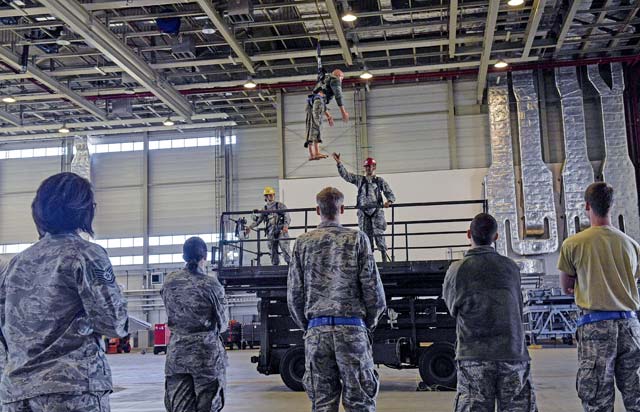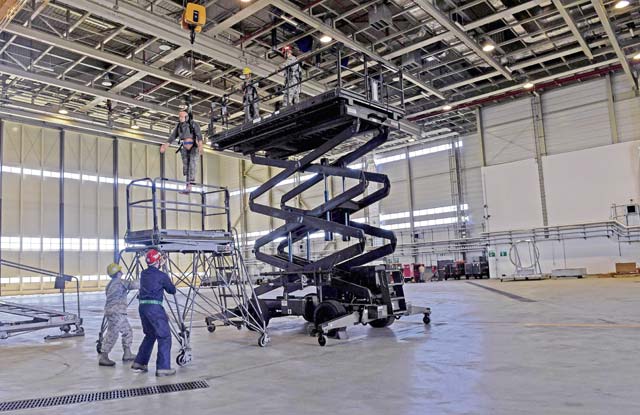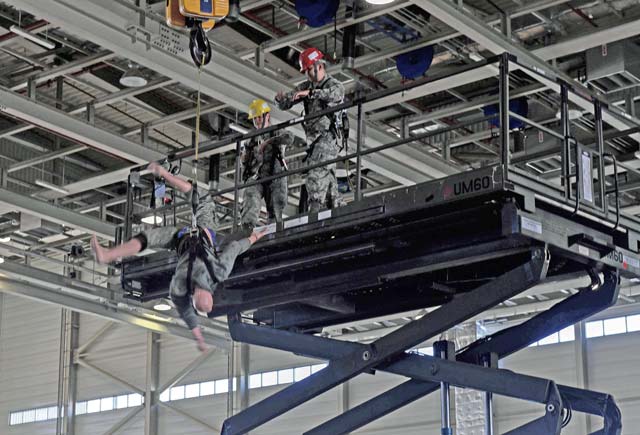
Airmen assigned to the 721st Aircraft Maintenance Squadron participate in fall protection training May 10 on Ramstein. The training was conducted as part of the Occupational Safety and Health Administration’s National Fall Prevention Stand-Down, which encourages employers to train their employees on fall hazards and the importance of fall protection. — Photo by Senior Airman Tryphena Mayhugh
Hundreds of fall mishaps occur across the Air Force every year, resulting in thousands of lost work days, and much worse outcomes. Air Force personnel were involved in almost 3,500 falls resulting in 13 fatalities from 2012 to 2016, and this number doesn’t even include sports-related falls during the same time period.
This data is just part of the reason Air Mobility Command is pushing to have all AMC units across the Air Force participate in the Occupational Safety and Health Administration Fall Safety and Prevention Stand-Down Week.
On Ramstein, the 521st Air Mobility Operations Wing’s 721st Aerial Port Squadron and 721st Aircraft Maintenance Squadron participated in refresher training for fall prevention and safety.
For the 721 APS, the training included how to inspect and wear safety harnesses, a fall rescue exercise and suspension training.
Airman 1st Class Hector Montoya, 721 APS ramp service specialist, gave the training for his squadron.
“For everyone in a hazardous workplace, situational awareness is the biggest thing,” Montoya said. “There are hazards all over the place, but sometimes the job gets so routine we don’t realize the hazards around us that we have to stay aware of.”

Along with high fall protection, OSHA is pushing out training on common workplace fall hazards such as slips and trips, which are the top causes of workplace mishaps, as well as ladder and stair safety.
“Safety is our number one priority,” said Master Sgt. Ryan Armour, 721 APS Safety superintendent, “The one thing that we emphasize to the newest Airmen is that we do everything at the speed of safe. We aren’t going to do something just to get an aircraft off the ground on time. We’re going to make sure we do everything safely first, then worry about time.”
When the 721 APS trains for safety, they are protecting more than their own people and resources. They are protecting everything that their work affects.
According to Chief Master Sgt. Joseph Neubauer, 721 APS superintendent, the squadron functions at a very high level as it supports mainly U.S. European Command and U.S. Africa Command. They send passengers and cargo all around the world, meaning that if their mission is affected by poor safety practices, the results could be felt globally.
“We’re basically moving bullets, beans and bags,” Neubauer said, “We’re doing everything we can to get passengers and cargo down range and making sure combatant commanders have what they need.”
Thus, the 721 APS continues to remind its Airmen daily to take care of themselves.
“Without safety, you can’t accomplish a mission,” Armour said. “Once a mishap occurs everything has to stop. In the end, it costs time, money, and lives.”
Montoya’s training included walking APS Airmen through harness safety and fall victim rescue.
“The training went well,” Montoya said. “Everyone got a feel for it. I think they’re safer and more informed.”
According to Armour, the 721 APS has not had a problem with fall incidents in the past.
The squadron intends to keep it that way as Airmen continue to work together with daily safety briefings and a constant emphasis on safety to make sure that at the end of the day everyone leaves with everything they came with.





